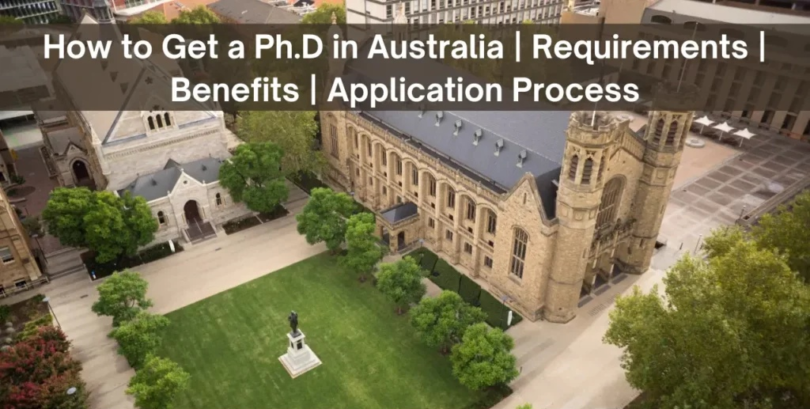Embarking on a journey to pursue a Ph.D. is a significant decision, one that can shape both your academic and professional future. When considering where to pursue such an advanced degree, Australia emerges as an enticing destination, offering a myriad of benefits and opportunities for aspiring scholars. Renowned for its world-class education system, Australia boasts top-tier research facilities, a diverse and vibrant academic community, and a high quality of life.In this guide, we’ll delve into the details of how to navigate the process of obtaining a Ph.D. in Australia, exploring the requirements, benefits, and application procedures. Whether you’re drawn to the rich research opportunities, the multicultural environment, or the promise of a globally recognized qualification, this comprehensive overview aims to provide you with the essential insights to kickstart your academic journey in the land down under.Why study in Australia? | Benefits of Pursuing a Ph.D. in AustraliaChoosing Australia for pursuing a Ph.D. can be highly appealing for several reasons, making it a popular choice among international students. Here are some compelling factors:
University Scholarships and Grants:
- University-specific Scholarships: Many Australian universities offer their own scholarships and grants to support Ph.D. students. These scholarships may be merit-based, need-based, or specific to certain fields of study.
- Faculty and Departmental Scholarships: Some faculties or departments within universities offer scholarships tailored to Ph.D. students in their respective disciplines. These scholarships often provide financial support and may include opportunities for research or teaching assistantships.
- External Funding Sources:Australian Research Council (ARC): The ARC offers a range of funding schemes to support research across all academic disciplines. Ph.D. students may be eligible to apply for ARC grants through their university or as part of collaborative research projects.National Health and Medical Research Council (NHMRC): The NHMRC funds health and medical research in Australia, including Ph.D. projects in areas such as biomedical sciences, public health, and clinical research.Industry Partnerships and Collaborations: Ph.D. students may have the opportunity to secure funding through industry partnerships, collaborative research projects, or research consortia. These partnerships can provide financial support as well as valuable industry experience and networking opportunities.4. International Scholarships and Fellowships:Australia Awards: The Australia Awards Scholarships, funded by the Australian Government, offer opportunities for international students from eligible countries to undertake Ph.D. studies in Australia. These scholarships cover tuition fees, travel expenses, and living allowances.International Research Collaboration and Exchange Programs: Many universities in Australia have partnerships with international institutions that offer scholarships or funding for Ph.D. students to participate in research collaborations, exchange programs, or joint supervision arrangements.5. Application and Eligibility:Eligibility Criteria: The eligibility criteria for scholarships vary depending on the scholarship provider and the specific scholarship program. Common eligibility requirements include academic merit, research experience, and citizenship or residency status.Application Process: Ph.D. applicants typically need to apply for scholarships separately from their university application. The application process may require submission of academic transcripts, CV, research proposal, letters of recommendation, and other supporting documents.
- Duration and Renewal:
- Duration: Scholarship durations vary but typically cover the length of the Ph.D. program, which is usually three to four years full-time.
- Renewal: Some scholarships may be renewable for subsequent years subject to satisfactory academic progress and research milestones.
- 7. Additional Support Services:
- Financial Counselling: Universities in Australia offer financial counselling services to assist students with managing their finances, budgeting, and accessing additional support.
- Employment Opportunities: Ph.D. students may also have opportunities for part-time employment within their university as research assistants, tutors, or teaching assistants to supplement their income.
- Frequently Asked Questions
- 1. Do International Students Need a Visa to Study in Australia?
- Yes, international students must obtain a visa to study in Australia. The specific type of visa required for a Ph.D. student is the Student Visa (subclass 500), which covers participation in an accredited full-time study program. Here are key points about this visa:
- 2. Is studying in Australia worth it?
- Studying in Australia can be highly beneficial due to its world-class universities, high-quality education, and extensive research opportunities. The multicultural environment and high standard of living contribute to a rewarding cultural experience and personal growth. Graduates benefit from strong global job prospects and valuable industry connections, often supported by post-study work rights.
- What is the cost of studying in Australia?
- Fees vary between universities and courses. However, they are typically between AU $25,000 and AU $35,000 a year, although some specialist subjects can be as much as AU $65,000.
- 4. How much money is required to study in Australia?
- Australia has a high cost of living. You can expect, even with a frugal lifestyle, to need at least AU $20,000 a year.
- 5. Can I study in Australia without IELTS?
- You will need to demonstrate enough fluency in English to cope with your course. If you’re educated in an English-speaking country, this may not be necessary. Alternatively, all universities accept PTE Academic and most also accept TOEFL-IBT.
- What are the requirements to study in Australia? You will need to have secured a place at a recognised institution through their application process. Once you have this, you must apply for a student visa to allow you to travel to Australia. 7. What exams are required to study in Australia? The exact exams and results will vary between courses and universities. For undergraduate courses, these will be the equivalent of Australia’s secondary education certificate (which itself varies between states), such as A-levels, International or European Baccalaureate or the American SAT. For postgraduate courses, it will be a relevant undergraduate qualification. 8. How to get permanent residency while studying in Australia? Permanent residency is not available to students. However, it may be possible to apply for permanent residency when working afterwards if your employer sponsors you, or you have specific skills the government has identified as needed. Permanent resident status gives you additional rights and can be a stepping-stone to Australian citizenship.







